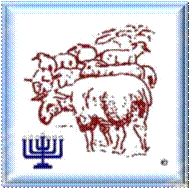

B e g i n n i n g s
When the early ministry of Jesus was finished there remained as the fruits of his teaching a number of Jews who were convinced that he was their expected Messiah.
Between these Jewish believers distributed among the towns and villages of Israel, little or no connection at first existed. Their life remained unaltered; they worshipped in the synagogues with their fellow Jews, and were distinguished only by their adherence to the Galilean Wonder-Worker, whose claims they no doubt pressed as occasion offered. The driving force of the future Nazarene sect was concentrated in a small body of the Messiah's most intimate friends and some members of his family, who, according to the account in Acts, took up residence in Jerusalem in anticipation of his speedy and glorious return. This was the fundamental and the inspiration of their teaching--the resurrection and ascension of the Messiah and his coming again in due season to re-establish the kingdom of God and of Israel.
This was their belief, and the power of it, that invested the original community of humble persons with dignity and confidence of the Gospel, the Good News!
Selected notes from The History of Jewish Christianity, Hugh Schonfield
5 out of 5 stars AN EXTREMELY IMPORTANT HISTORICAL WORK ON THE EARLY "MESSIANIC" MOVEMENT
These days, if Hugh Schonfield is remembered, it's as the author of The Passover Plot: Special 40th Anniversary Edi-tion (1965), a somewhat lurid tale of Jesus deliberately attempting to fulfill the Messianic prophecies and convince people he was the Messiah; only the "plot" failed, when a soldier stuck a spear into his side while on the cross. But believe it or not, in his earlier days, Schonfield (1901-1988)---who was Jewish---was a "Jewish Christian"; what would nowadays be termed a "Messianic Jew" (or formerly, a "Hebrew Christian"). All of Schonfield's earlier works re-flect this orientation (e.g., The Authentic New Testament, The Bible Was Right: New Light on the New Testament, An Old Hebrew Text of St. Matthew's GospelSaints Against Caesar: The Rise and Reactions of the First Christian Communi-ty, The Jew of Tarsus,: An unorthodox portrait of Paul, etc.). Much of Schonfield's earlier work (such as the book on Paul) are forgettable, nowadays; but his "History of Jewish Christianity" is a real diamond, and it's wonderful to see it back in print, in ANY form.
The importance of this book is even recognized by modern evangelical Messianic Jews (who are utterly repulsed by Schonfield's later books). Schon-field notes that "A few Christian scholars who have been at pains to study the subject have deplored the lack of any text book to which the student could turn ... Clearly, then, the gap is there to be filled." Schonfield's book fills this gap admirably---at least, through the 1936 date of its publication. The book begins with a survey of Jesus' disciples themselves (Schonfield notes, for example, that "Paul himself re-mained an observant Jew to the end of his life"), and continues through the New Testament period, as well as the later writings professing to be Biblical, but not included in any Biblical canon, the Bible, and Talmudic works (the collection of ancient Jewish writings that forms the basis of Jewish religious law, consisting of the early scriptural interpretations). However, with the rise of the Roman Empire, Schonfield notes that "Jewish Christianity never regained its position of authority in the affairs of the Church." He notes that from this point, the Christian Church's position towards Jews in Europe "was less by reason and charity and more by compulsion, intimidation and active violence." Many Jews (such as the Marranos in Spain) were "forcibly" converted.
Nevertheless, Schonfield notes that "sincere Jewish Christians ... must always be distinguished from Christianized Jews." There were even Jewish mystics such as Jacob Frank (Schonfield says that "Undoubtedly there is a place in the Christian Church for the Jewish mystic") and the Chassidic movement, whom he treats sympathetically. Most modern readers, however, will be most interested in his account of the earliest "missions to the Jews" among Protestants ("The debt of Jewish Christianity to the modern Protestant missions is indeed an overwhelming one"), as well as the rise of voluntary Jewish conversions beginning in the 19th century, and the later formation of associations such as the "Beni Abraham association," the "Hebrew Christian Prayer Union," and the "Israelites of the New Cove-nant," as well as the formation of worshipping congregations under men like Joseph Rabinowitz. For persons interested in Messianic Judaism, the history of the Christian Church, or even the history of Jews, this book---though old---is fascinating reading, and very helpful.
Highly recommended! Steven H Propp

To Return To




